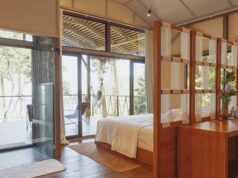 Hotels and resorts are facing increased costs for garbage collection as fuel for collection vehicles increases and landfills increase their dumping fees. Landfills also create environmental problems by polluting the ground water underneath and the air above them. These environmental problems are caused by organic waste. The organic waste component of landfill is broken down by micro-organisms to form a liquid ‘leachate’ which contains bacteria, rotting matter and often chemical contaminants. This leachate can present a serious hazard if it reaches open water or enters the water table. Organic matter in landfills also generates methane, which in large quantities is a harmful greenhouse gas. One solution is on-Site in-vessel organic waste composting.
Hotels and resorts are facing increased costs for garbage collection as fuel for collection vehicles increases and landfills increase their dumping fees. Landfills also create environmental problems by polluting the ground water underneath and the air above them. These environmental problems are caused by organic waste. The organic waste component of landfill is broken down by micro-organisms to form a liquid ‘leachate’ which contains bacteria, rotting matter and often chemical contaminants. This leachate can present a serious hazard if it reaches open water or enters the water table. Organic matter in landfills also generates methane, which in large quantities is a harmful greenhouse gas. One solution is on-Site in-vessel organic waste composting.
The main forms of organic waste at a hotel or resort are food waste and landscape waste. In-vessel composting is a simple, cost effective method to address the environmental problems and save money in fertilizer.
In-vessel composting equipment basically includes a drum (vessel) that can range from three feet in diameter to 10 feet. The drum rotates only four revolutions per hour by electrical power—two hours on and 10 hours off—using very little electrical energy. Heat is generated inside the drum naturally by the combination of carbon and nitrogen in the organic waste combined with oxygen (the aerobic process) as the mixture is turned very slowly. In a four-day cycle, temperatures exceeding 131 degrees F can be attained.
Compost Equals Fertilizer
From a small hotel to a large resort, successful composting of kitchen and yard waste can be achieved. For example, The Breakers Resort in West Palm Beach Fla., a five star property, and a Sofitel boutique hotel in Miami Beach, Fla., have been part of a test project with the South Dade Soil & Water Conservation District. These properties separate the food waste in their kitchens into 5 gallon buckets, which are transported to the recycling area. The food waste is deposited into the vessel composter, along with the landscaping waste. Both properties are using this compost on site to fertilize their landscaping, creating substantial savings in added nutrients through soil and fertilizer.
Organic waste products that can be successfully in-vessel composted in three to four days include food waste, yard waste, soiled paper waste, and wastewater residuals. Animal parts require longer (up to 10 days in the vessel) to compost. As these organic waste products are mixed and loaded into the vessel, no odors, leachate or vermin attraction is produced.
The resulting compost is then cured on a pile for seven to 10 days until the temperature of the curing pile is less than 90 degrees F. The entire in-vessel composting process produces a valuable soil amendment in only two weeks, ready to be reused on site or sold to agricultural interests, landscapers, golf courses, and parks. A commercial in-vessel composting system like the one described above will cost approximately $30,000 depending on the specifications. Commercial in-vessel composters in South Florida have paid for their machines in less than a year by selling high grade fertilizer.
There are a lot of options when it comes to composting. Once a composting system is in place any hotel can see the benefits not only for the environment but also for their bottom line.
Dina M. Belon is a principal and an owner of RUSH Hospitality, a sustainable hospitality renovation company, providing design, procurement and construction services. Dina is a licensed interior designer in the state of Florida, and a LEED Accredited Professional. She is an active member of the U.S. Green Building Council. Additionally, Dina is very involved in NEWH (The Hospitality Industry Network), chairing the Sunshine Chapters Sustainable Committee, and as a member of the International Sustainable Hospitality Committee, which helps educate the hospitality community on sustainability. Dina is also a member of the ARDA (American Resort Development Assn.) Construction and Design Committee and the Sustainability Task Force. She can be reached at dbelon@rushhospitality.com.







